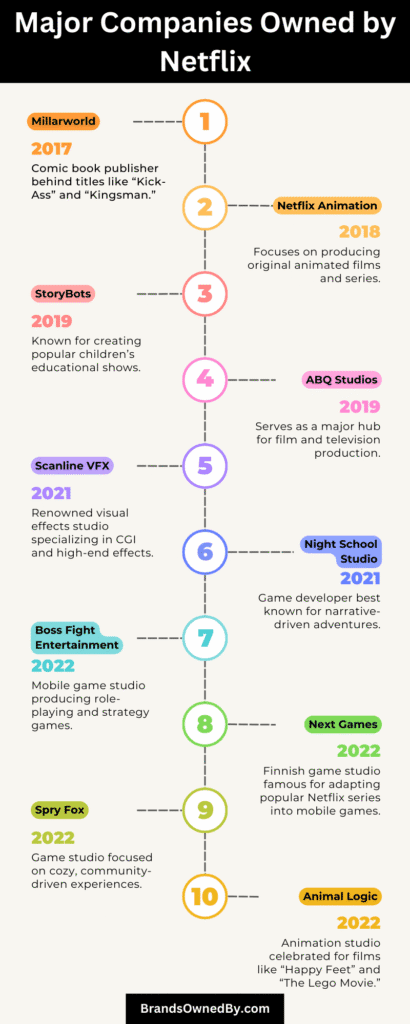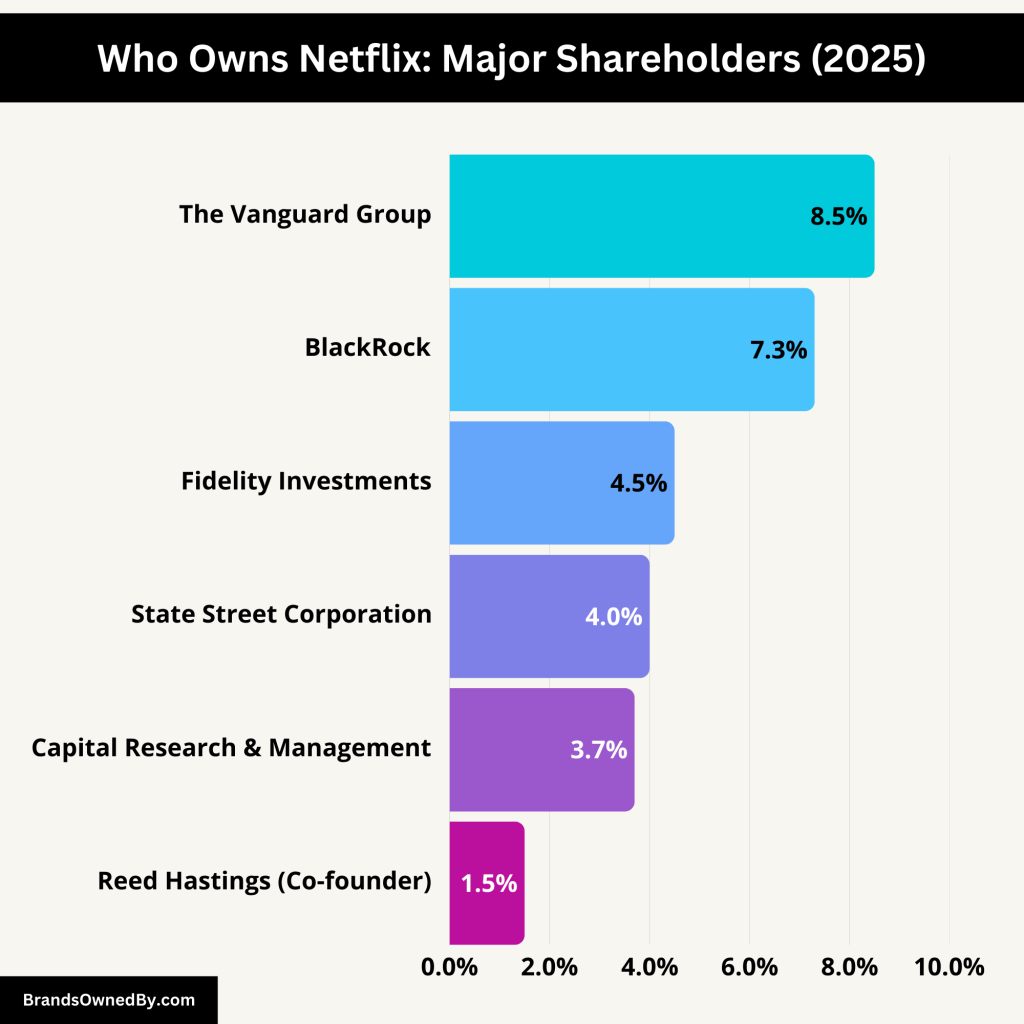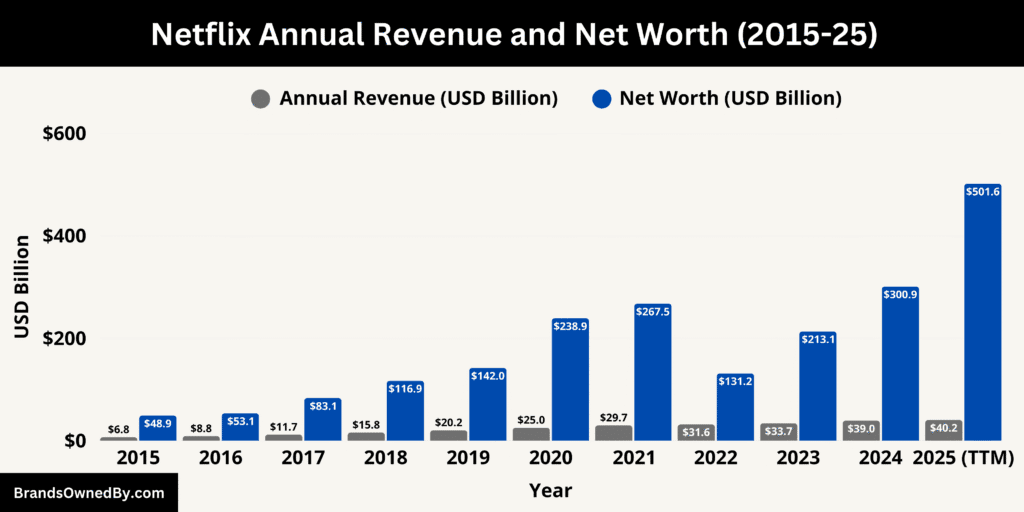Netflix has grown from a small DVD rental service into a global leader in streaming entertainment. Over the years, it has expanded far beyond being just a platform for shows and films. Today, it owns studios, production facilities, and creative properties that power its original content strategy. Many ask what companies does Netflix own, since its acquisitions and in-house divisions play a key role in shaping what millions of viewers watch worldwide.
Exploring these holdings shows how Netflix built one of the strongest entertainment ecosystems.
Netflix Company Profile
Netflix is one of the world’s largest subscription-based streaming entertainment platforms. It offers TV shows, movies, documentaries, and original programming to millions of subscribers across more than 190 countries. Known for its data-driven recommendations and original productions, Netflix has become a global leader in digital media.
Founders and Early Years
Netflix was founded in 1997 by Reed Hastings and Marc Randolph in Scotts Valley, California. The company began as an online DVD rental-by-mail service, offering convenience at a time when late fees and physical rental stores dominated the market.
In 2007, Netflix introduced its streaming service, allowing subscribers to instantly watch content online. This innovation changed the way people consumed entertainment and marked the company’s move toward becoming a digital-first platform.
In 2013, Netflix released House of Cards, its first original series. This was a defining moment that shifted the company from distributor to producer. Its success led to other hit originals like Orange Is the New Black and Stranger Things, making Netflix a trusted brand for exclusive, high-quality content.
Between 2010 and 2016, Netflix rapidly expanded internationally. By 2016, it launched its service in over 130 new countries, bringing its content library to audiences worldwide.
Major Milestones
- 1997 – Netflix is founded by Reed Hastings and Marc Randolph.
- 1998 – The company launches its website and begins offering DVD rentals by mail.
- 1999 – Netflix introduces a subscription model with unlimited rentals.
- 2002 – The company goes public on NASDAQ under the ticker NFLX.
- 2007 – Netflix launches its streaming service in the United States.
- 2010 – The service begins international expansion, starting in Canada.
- 2013 – Release of House of Cards, Netflix’s first original series.
- 2016 – Netflix goes global, launching in over 130 new countries in one day.
- 2017 – Netflix acquires comic publisher Millarworld, marking its entry into owning IP.
- 2018 – The company acquires ABQ Studios in New Mexico to support in-house production.
- 2021 – Launch of mobile games for subscribers and broader ventures into interactive content.
- 2022 – Introduction of a lower-cost ad-supported subscription tier.
- 2022 – Stranger Things Season 4 becomes the most-streamed series of the year, breaking Netflix viewing records.
- 2022 – Netflix signs on with the Broadcasters’ Audience Research Board in the UK, expands cloud gaming plans, and secures land for a production complex in New Jersey.
- 2023 – Netflix ends its long-running DVD-by-mail service.
- 2023 – Netflix restructures its animation division and strikes an animation film deal with Skydance. It also launches the first “What We Watched” engagement report detailing top titles from the first half of 2023.
- 2024 – Netflix expands into live content and sports—including an exhibition boxing match and a landmark deal with WWE to stream “Raw” starting in 2025.
- 2024 – Launch of “Netflix House” interactive entertainment venues, and Netflix begins streaming NFL Christmas Day games.
- 2024–2025 – Squid Game Season 2 breaks viewing records; global subscribers exceed 300 million; Netflix introduces a redesigned interface to improve discovery.
- 2025 – Netflix surpasses 300 million global subscribers and reports strong Q2 revenue growth.
List of Companies Owned by Netflix

Netflix owns a small but impactful set of companies. These reflect its commitment to producing high-quality content and maintaining a robust technological infrastructure.
Netflix’s direct ownership extends across several creative and technological sectors:
- IP & content brands: Millarworld, StoryBots, and Roald Dahl Story Company
- Animation & VFX: Netflix Animation, Animal Logic, Scanline VFX, and ABQ Studios
- Gaming studios: Night School Studio, Boss Fight Entertainment, Next Games, and Spry Fox
- Venue: Grauman’s Egyptian Theatre
- Global subsidiaries: Netflix entities in regional markets worldwide handle production, services, licensing, and operations.
Here is a list of the major brands, subsidiaries, and companies owned by Netflix as of 2025:
| Company/Brand | Type | Acquisition/Founding Year | Key Details |
|---|---|---|---|
| Millarworld | Comic Book Publisher / IP | 2017 | Comic book publisher founded by Mark Millar; IP used for Netflix Originals. |
| StoryBots | Educational Media Brand | 2019 | Children’s educational brand; includes Ask the StoryBots series. |
| Roald Dahl Story Company | Book Publishing & IP Rights | 2021 | Rights to works of Roald Dahl; basis for films, series, and cross-media projects. |
| Animal Logic | Animation & VFX Studio | 2022 | Australian animation studio; known for Happy Feet and The Lego Movie. |
| Scanline VFX | VFX Studio | 2022 | High-end VFX studio; advanced simulations of water, fire, and destruction. |
| Night School Studio | Game Development Studio | 2021 | Indie game studio; created Oxenfree and narrative-driven games. |
| Boss Fight Entertainment | Game Development Studio | 2022 | Mobile game studio; focuses on strategy and RPG experiences. |
| Next Games | Game Development Studio | 2022 | Finnish mobile game studio; created Stranger Things: Puzzle Tales. |
| Spry Fox | Game Development Studio | 2022 | Seattle-based studio; known for casual and creative games like Alphabear. |
| Netflix Animation | Animation Studio | 2018 (founded by Netflix) | In-house Netflix studio producing animated films and series. |
| Albuquerque Studios (ABQ Studios) | Production Facility | 2018 | Major production hub in New Mexico; supports Netflix Originals filming. |
| Grauman’s Egyptian Theatre | Theatre / Venue | 2020 | Historic Los Angeles theater used for premieres and screenings. |
| Regional Subsidiaries & Entities | Global Operational Entities | Various (Global Expansion) | Regional subsidiaries for content, licensing, and production worldwide. |
Millarworld
Netflix acquired Millarworld in 2017, marking its first major venture into proprietary intellectual property (IP). Founded by Mark Millar, Millarworld is a comic book publisher behind titles like Kick-Ass and Kingsman. The acquisition gave Netflix a vault of original superhero and fantasy IP.
These stories serve as source material for exclusive film and television adaptations. Millarworld now functions as a creative powerhouse within Netflix, fueling projects across formats and strengthening its storytelling pipeline.
StoryBots
In 2019, Netflix acquired the StoryBots franchise—an educational media brand aimed at children aged three to eight. This includes the popular series Ask the StoryBots, as well as books, music, and digital content. StoryBots blends whimsical animation with solid educational value. Its addition has enriched Netflix’s offerings for early childhood viewers and helped reinforce its programming in the kids’ education space.
Roald Dahl Story Company
Netflix made its largest acquisition in 2021 with the Roald Dahl Story Company. This granted exclusive access to the works of the beloved author, including Charlie and the Chocolate Factory, Matilda, The BFG, and Fantastic Mr. Fox. Netflix has plans to build an entire entertainment universe around these timeless stories.
The acquisition spans live action, animation, theatre, publications, games, immersive experiences, and more.
Animal Logic
In mid-2022, Netflix acquired Animal Logic, a respected animation and visual effects studio based in Australia with offices in Los Angeles and Vancouver. Known for classics like Happy Feet, The Lego Movie, and Legend of the Guardians, Animal Logic brought deep animation expertise into the Netflix fold. In early 2024, it merged with Netflix Animation to consolidate creative leadership, aiming to streamline animated content production across feature films and series.
Scanline VFX
Netflix completed the acquisition of Scanline VFX in early 2022. Scanline, with roots in Munich and offices across major film production hubs, is celebrated for its advanced simulations of water, fire, and other realistic effects. Unlike other in-house units, Scanline continues offering services to external clients. Still, its integration has bolstered Netflix’s capacity to deliver high-end VFX internally and more efficiently.
Night School Studio
In September 2021, Netflix purchased Night School Studio, a small indie developer known for narrative-focused games like Oxenfree and Afterparty. The studio continues operating under its own name, crafting unique, atmospheric games that fit Netflix’s strategy for interactive content and immersive storytelling experiences.
Boss Fight Entertainment
This Texas-based mobile game developer, known for strategy and RPG titles, joined Netflix in March 2022. Boss Fight bolsters Netflix’s casual and mid-core gaming offerings, often tied to Netflix originals. Their expertise helps Netflix quickly scale engaging mobile game experiences for subscribers.
Next Games
Next Games, a Finnish studio, became part of Netflix in March 2022. Known for licensed games like Stranger Things: Puzzle Tales and The Walking Dead: No Man’s Land, Next Games enhances Netflix’s capacity to develop mobile titles linked to its original series. Their background in adapting entertainment IP into games makes them a strategic fit.
Spry Fox
Spry Fox, acquired in October 2022, is a Seattle-based game studio celebrated for creative and narrative-driven casual games like Alphabear and Cozy Grove. Its design sensibility complements Netflix’s diverse gaming portfolio, bringing charm, storytelling, and innovation to its interactive layer.
Netflix Animation
Established in 2018, Netflix Animation is the company’s in-house animated content studio. Operating from Burbank with branches in Sydney and Vancouver, it produces exclusive series and films. Following the 2024 consolidation with Animal Logic’s animation arm, the studio now serves as the core hub for Netflix’s animated storytelling.
Albuquerque Studios (ABQ Studios)
Netflix acquired this production facility in New Mexico in 2018. ABQ Studios includes sound stages, production offices, and a backlot. It serves as a central hub for filming many of Netflix’s major series and films. Netflix has since expanded the site with continued investment in infrastructure to support large-scale productions.
Grauman’s Egyptian Theatre
While not always publicized at scale, Netflix owns and operates Grauman’s Egyptian Theatre in Los Angeles. The historic venue is often used for premiere events and aligns with Netflix’s efforts to maintain a physical presence and special screening venues in key markets.
International and Holding Subsidiaries
Netflix also operates a broad network of regional and functional subsidiaries (hundreds worldwide) to manage local licensing, production, distribution, and operations. Key entities include:
- Netflix Pte. Ltd. in Singapore manages content licensing and some original production in Asia.
- Holdings and service arms in countries such as Brazil, Mexico, France, Germany, the UK, Japan, Australia, Canada, Spain, and more.
- Internal production and distribution arms like Netflix Studios, Netflix Worldwide Productions, and Netflix Streaming Services.
Who Owns Netflix?

Netflix is a publicly traded company listed on the NASDAQ under the ticker NFLX. Ownership is distributed among institutional investors, insiders, and retail shareholders. Institutional investors hold the majority of Netflix stock, while company founders and executives maintain smaller but notable stakes.
Below is a list of the major shareholders of Netflix as of August 2025:
| Category | Approximate Share of Ownership | Major Stakeholders |
|---|---|---|
| Institutional Investors | ~85% | Vanguard, BlackRock, Fidelity, State Street, others |
| Insiders (Executives) | ~6% | Reed Hastings and selected executives |
| Retail / Individual Holders | ~12–15% | General public and smaller investors |
The Vanguard Group
The Vanguard Group is the largest single shareholder of Netflix. It owns around 8–9% of the company’s outstanding shares. As one of the world’s biggest asset managers, Vanguard has significant influence over corporate decisions through its voting rights.
BlackRock, Inc.
BlackRock holds approximately 7% of Netflix. Known as the world’s largest investment management firm, BlackRock’s stake makes it one of the top decision-shaping entities in Netflix’s shareholder structure.
Fidelity Investments (FMR, LLC)
Fidelity controls about 5% of Netflix stock. Its investment is part of a broader strategy to back leading technology and entertainment companies. Fidelity’s influence extends through its active role in shareholder voting and governance.
State Street Corporation
State Street owns around 4% of Netflix. It is one of the “big three” U.S. asset managers alongside Vanguard and BlackRock. State Street’s stake strengthens the institutional dominance over Netflix ownership.
T. Rowe Price
T. Rowe Price holds a smaller but significant portion of Netflix shares, estimated between 1% and 3%. The firm is known for long-term equity investments in innovative companies, making Netflix a strategic part of its portfolio.
Capital World Investors
Capital World Investors maintains a stake in Netflix ranging from 1% to 3%. As part of Capital Group, it is one of the largest global investment firms with a reputation for long-term growth investing.
JPMorgan Chase
JPMorgan Chase, through its asset management arm, also owns between 1% and 3% of Netflix stock. Its investment in Netflix aligns with its broader exposure to technology and media companies.
Geode Capital Management
Geode Capital Management holds a small but meaningful stake in Netflix, generally between 1% and 2%. As an institutional investor, it often acts as a sub-advisor for larger funds like Fidelity, expanding its influence indirectly.
Capital Research Global Investors
Capital Research Global Investors owns a modest portion of Netflix shares. While smaller compared to Vanguard or BlackRock, it remains an active participant in shareholder decisions.
Reed Hastings
Reed Hastings, co-founder and former co-CEO of Netflix, retains ownership of around 1–2% of the company. Although he stepped back from day-to-day leadership, his stake and position as executive chairman ensure he continues to play a role in guiding Netflix.
Ted Sarandos and Other Executives
Ted Sarandos, co-CEO, along with other executives and board members such as David Hyman and Jay Hoag, hold smaller individual stakes. Their combined holdings form part of insider ownership, which typically accounts for around 6% of Netflix stock.
Retail Shareholders
Retail or individual shareholders collectively own around 12–15% of Netflix. These are everyday investors who purchase stock through brokerages or trading platforms. While individually smaller, together they form an important base of long-term investors.
Who is the CEO of Netflix?
Netflix operates under a co-CEO structure, an approach that allows the company to balance creativity with operational excellence. Since 2023, the leadership has been shared by Ted Sarandos and Greg Peters. Sarandos oversees content strategy and creative development, shaping Netflix’s global storytelling vision, while Peters focuses on operations, product innovation, and scaling the platform.
Together, they bring complementary strengths that have helped Netflix maintain its leadership in the streaming industry while also expanding into new areas such as advertising, gaming, and emerging technologies.
| Co-CEO | Focus Areas | Key Initiatives & Highlights |
|---|---|---|
| Ted Sarandos | Content, strategy, creative innovation | Drives product strategy, ad tech implementation, and global subscriber expansion |
| Greg Peters | Operations, product, monetization | Drives product strategy, ad tech implementation, global subscriber expansion |
Ted Sarandos (Co-CEO – Content and Strategy)
Ted Sarandos is one of Netflix’s two co-CEOs, a role he has held since January 2023. He previously served as Chief Content Officer, where he pioneered the company’s shift into original programming, starting with early successes like House of Cards and Lilyhammer.
As co-CEO, Sarandos continues to lead creative strategy and oversee content development across the company. He champions Netflix’s philosophy of being “builders, not buyers,” emphasizing in-house innovation over large-scale acquisitions.
He also has articulated an ambitious vision for Netflix’s long-term growth—pointing to its path toward a trillion-dollar market valuation through continued expansion of content and subscriber base.
Under his leadership, Netflix has also made inroads into leveraging emerging technologies like generative AI to support creative output.
Greg Peters (Co-CEO – Operations and Product)
Greg Peters shares the top leadership role with Sarandos and became co-CEO in 2023 after having served as Netflix’s Chief Operating Officer and Chief Product Officer. Peters brings operational acumen and product innovation to the executive suite.
He has driven major strategic initiatives—such as the rollout of Netflix’s own ad tech platform and overseeing efforts to monetize the advertising subscription tier.
Peters also emphasizes the importance of positioning Netflix for scale through interface enhancements, product experimentation, and global subscriber growth.
Dual Leadership Model – Why It Works
Netflix’s co-CEO structure is a rare but successful model. Sarandos and Peters divide responsibilities, with one focusing on creative and strategic content, and the other managing operations, product development, and infrastructure. This team dynamic builds on their complementary skills and long-standing collaboration.
This partnership structure has earned praise for its clear division of expertise, acting as a “high performance technique” and driving stronger decision-making
Netflix Annual Revenue and Net Worth

In 2025, Netflix generated over $40 billion in annual revenue and holds a market valuation above $500 billion, placing it among the most valuable media companies worldwide. The company’s net worth reflects its dominance in streaming, while its revenue growth shows the success of new ventures like gaming, live events, and an ad-supported tier.
Below is an overview of the annual revenue and net worth of Netflix from 2015-25:
| Year | Annual Revenue (USD, billions) | Market Value (USD, billions) |
|---|---|---|
| 2015 | 6.78 | 48.94 |
| 2016 | 8.83 | 53.12 |
| 2017 | 11.69 | 83.06 |
| 2018 | 15.79 | 116.85 |
| 2019 | 20.15 | 141.98 |
| 2020 | 24.99 | 238.89 |
| 2021 | 29.69 | 267.46 |
| 2022 | 31.61 | 131.22 |
| 2023 | 33.72 | 213.09 |
| 2024 | 39.00 | 300.85 |
| 2025 (TTM) | 40.17 | 501.62 |
Annual Revenue 2025
Netflix reported approximately $41.7 billion in revenue for the trailing twelve months ending June 30, 2025. This reflects a strong year-over-year increase of nearly 47%, driven by a mix of subscription growth, the expansion of its ad-supported tier, and favorable foreign exchange movements.
Q2 2025 Quarter Revenue
In the second quarter of 2025, Netflix posted around $11.08 billion in revenue—an increase of about 16% compared to the same quarter the previous year. This quarterly performance exceeded expectations and was powered by improved subscriber uptake, pricing adjustments, and notable ad revenue expansion.
Full-Year 2025 Revenue Forecast
At mid-year, Netflix raised its annual revenue projection for 2025 to a range of $44.8 billion to $45.2 billion. This revision is attributed to consistent business momentum, increased ad-tier adoption, and a weaker U.S. dollar, boosting international earnings
Netflix Net Worth 2025
As of August 2025, Netflix’s market capitalization has climbed to approximately $526 billion, reinforcing its status as a mega-cap entertainment company.
Some estimates place it marginally higher—up to $529 billion in August 2025—depending on market fluctuations.
This marks a dramatic rise from end-of-2024 valuations, when Netflix was valued at around $381 billion, highlighting a year-over-year increase of about 95%.
With this valuation, Netflix ranks among the most valuable companies globally, consistently appearing in the top 20 by market capitalization.
Final Thoughts
Over the years, Netflix has evolved into more than just a streaming service. By owning studios, creative properties, and production facilities, it ensures a steady flow of original content for its global audience. This strategy has helped the company stay competitive in an industry that changes quickly. Understanding what does companies Netflix own highlights how it continues to shape the entertainment landscape and maintain its position as a leader in digital media.
FAQs
What major companies are owned by Netflix?
Netflix owns several key subsidiaries and brands that strengthen its operations. These include Netflix Animation, StoryBots Inc., Scanline VFX, Boss Fight Entertainment, Next Games, Night School Studio, and Spry Fox. Each company plays a role in supporting Netflix’s streaming, gaming, or production ecosystem.
How many companies does Netflix own?
As of 2025, Netflix owns around a dozen direct subsidiaries and studios. These range from animation and visual effects firms to gaming studios acquired to expand Netflix’s entertainment portfolio.
Does Netflix have any subsidiaries?
Yes, Netflix has multiple subsidiaries. These include production units like Netflix Animation, interactive learning companies such as StoryBots, and gaming studios like Night School Studio, Boss Fight Entertainment, Next Games, and Spry Fox.
Is Netflix a public company?
Yes, Netflix is a publicly traded company. Its stock is listed on the NASDAQ exchange under the ticker symbol NFLX.
What are Netflix subsidiary companies?
Netflix’s subsidiaries include Netflix Animation, StoryBots, Scanline VFX, and its acquired game studios such as Night School Studio, Boss Fight Entertainment, Next Games, and Spry Fox. These subsidiaries help Netflix expand across streaming, animation, visual effects, and gaming.
How many companies has Netflix acquired?
Netflix has acquired around half a dozen companies, mostly between 2018 and 2023. These acquisitions include gaming studios and production companies that align with its long-term strategy to expand beyond video streaming.
Does Netflix own any companies?
Yes, Netflix owns multiple companies. These subsidiaries and acquisitions are strategically chosen to support content creation, animation, VFX, and gaming, ensuring Netflix stays competitive in entertainment.
What companies are affiliated with Netflix?
Companies affiliated with Netflix are its subsidiaries, including Netflix Animation, StoryBots, Scanline VFX, and gaming studios. Affiliations also extend to partnerships with technology firms, telecom providers, and content producers around the world.
Is Netflix owned by Disney?
No, Netflix is not owned by Disney. It operates independently as a publicly traded company. Disney runs its own streaming service, Disney+, which is a competitor to Netflix.
Who does Netflix partner with?
Netflix partners with telecom companies, smart TV manufacturers, content producers, and technology firms to distribute its content globally. Partnerships also include advertising collaborations since the launch of its ad-supported tier.
Is Netflix partnered with Amazon?
No, Netflix is not partnered with Amazon. In fact, Amazon competes directly with Netflix through its streaming service, Prime Video.
Netflix is owned by which country?
Netflix is an American company. It was founded in the United States in 1997 and is headquartered in Los Gatos, California.
What was Netflix’s first acquisition?
Netflix’s first acquisition was Millarworld in 2017, a comic book company that marked its foray into owning original intellectual property.
Does Netflix own any gaming companies?
Yes, Netflix owns several gaming studios including Night School Studio, Boss Fight Entertainment, and Next Games, all acquired between 2021 and 2022.
Why did Netflix acquire animation and VFX studios?
To reduce dependency on third-party providers and gain creative control over the production process, especially for high-quality originals.
Is StoryBots still available on Netflix?
Yes, StoryBots remains a key part of Netflix’s children’s programming and continues to release new educational content.
Does Netflix own any animation studios?
Yes, Netflix owns Animal Logic, an animation and visual effects studio known for creating films like The Lego Movie and Happy Feet.
What types of games does Netflix offer now?
Netflix offers mobile games through acquisitions like Night School Studio, Boss Fight Entertainment, and Next Games, focusing on casual and narrative-driven experiences.
Did Netflix buy any mobile game companies?
Yes, Netflix acquired several mobile game companies, including Night School Studio, Boss Fight Entertainment, and Next Games, to enhance its gaming offerings on its platform.
Is Millarworld exclusive to Netflix?
Yes, Millarworld’s IPs are exclusively available for Netflix, allowing the company to adapt these comic books into films, TV shows, and digital content.
How did Netflix acquire Animal Logic?
Netflix acquired Animal Logic in 2022 to enhance its animation and VFX capabilities, specifically for producing animated feature films and series.

